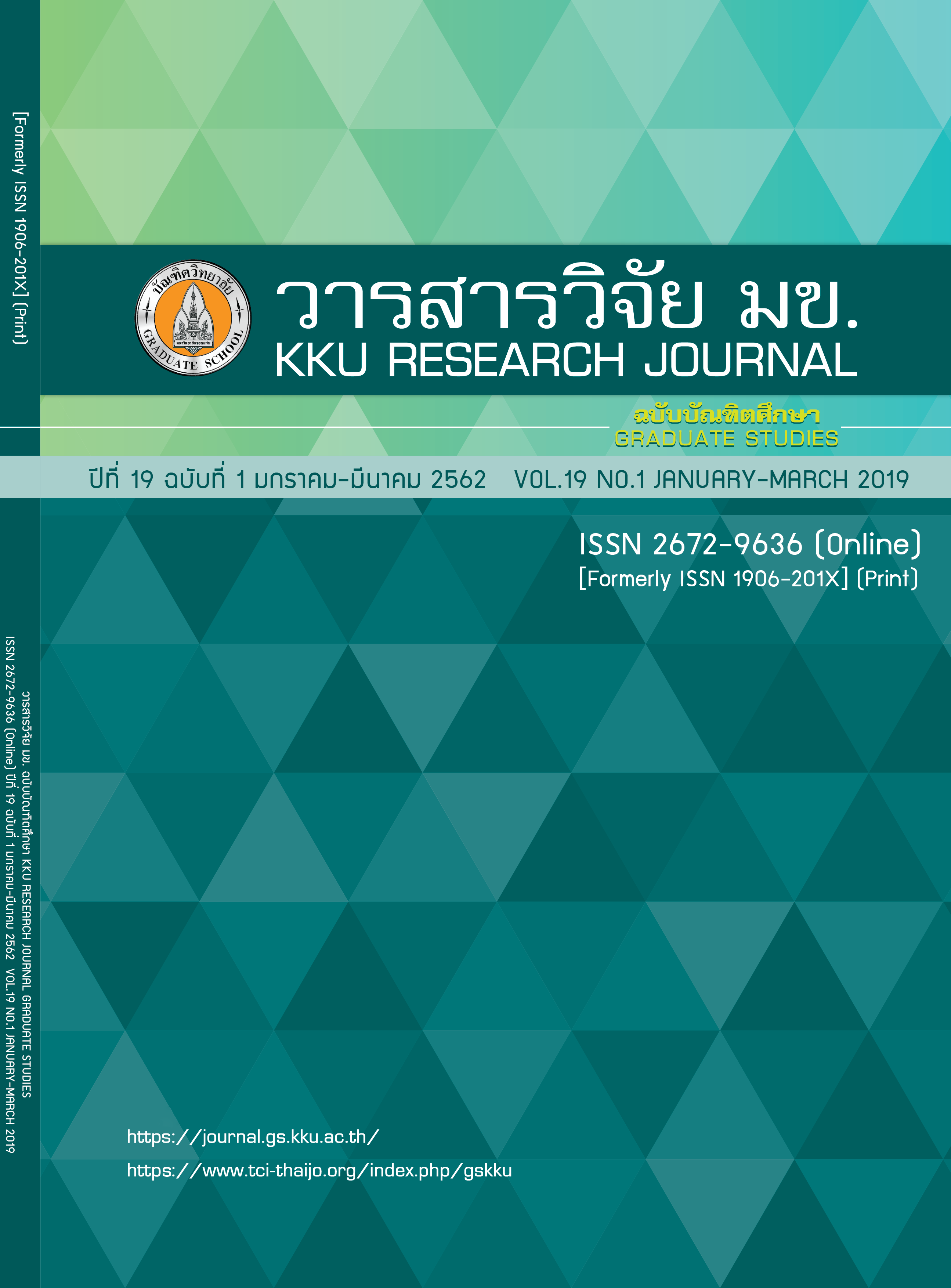A study of Black Bpot Improvement at Intersections of Engineering Faculty, Khon Kaen University by Applying Microscopic Traffic Simulation
Keywords:
Black spot improvements, Conflict point, Traffic simulationAbstract
The objective of this study is to propose and evaluate the measures to improving a group of intersections around the parking area of Engineering Faculty, Khon Kaen University by applying the traffic simulation. The author surveyed traffic during morning peak hours for model calibration and surveyed traffic during evening peak hours for model validation. The developed model could pass the calibration and validation process according to the international criteria. Then, the author applied the developed model to evaluate the proposed measures, including 1) Improvement to four-leg intersection with warning signs 2) Improvement to four-leg signalized intersection and 3) Improvement to roundabout. The evaluation results revealed that the improvement to roundabout is the most appropriate measure: the queue length is decreased by 50%; the average delay is decreased by 44%, and the conflict point is decreased by 41% compared to the existing condition. The results of sensitivity analysis showed that the traffic is increased 30% the improvement to roundabout is still the most appropriate measure : the queue length is decreased by 24%, the average delay is decreased 13%, and the conflict point is decreased by 51% compared the the existing condition.
References
2. Sustainable Infrastructure Research and Development Center (SIRDC), Khon Kaen University. 2012. complete report Project study and preparation of baseline emissions from Transportation sector in the pilot provinces and education guidelines for promotion. Greenhouse Gas Emission Reduction Activities, Department of Civil Engineering Faculty of Engineering Khon Kaen University Thai.
3. James Cox, OD Matrix Creator With Route Choice Program, Department for Transport, Energy & Infrastructure, South Australia. 2014.
4. Gopal R, Patil, Jayant P. Sangole ‘Behavior of two-wheelers at limited priority uncontrolled T-intersections’, Accident Analysis & Prevention, 2015.
5. Akhilesh Kumar Maurya, Harsh J, Amin, Arvind Kumar, ‘Estimation of Critical Gap for Through Movement at Four Leg Uncontrolled Intersection’ Transportation Research Procedia 17: 2016. 203–212.
6. Thepkaew A, Kornpraseart N, Phichayapunt P. ‘Analysis of Driving Behavior of Vehicles Entering Roundabouts under Mixed Traffic Conditions in Urban Area.’ , Proceedings of The 20th National Convention on Civil Engineering 8-10 July 2015, Chonburi, Thai.
7. A guide to documenting vissim-based microscopic traffic simulation models., Research Report, Agreement T4118, Task 09, Traffic Simulation Lab.
8. Vincenzo G, Vaiana R, Iuele T. ‘Comparison between Simulated and Experimental Crossing Speed Profiles on Roundabout with Different Geometric Features’, Procedia - Social and Behavioral Sciences, 111: 2014.
9. Wisconsin DOT, Microsimulation Guidelines http://www.wisdot.info/microsimulation/index.php?title= Model_Calibration: Wisconsin Department of Transportation. 2014.
10. Webster and cobbe, Traffic signals, Transportation and Road Research Laboratory (TRRL), England. 1966.
11. Kanittpong K. Guide to Design a Roundabout to Enhance Safety at intersection., Thailand Accident Research Center, Asian Institute of Technology. 2015. Thai.
12. Federal Highway Administration (FHWA) ‘Surrogate Safety Assessment Model (SSAM), Research, Development, and Technology, Turner-Fairbank Highway Research Center, US. Department of Transportation, 2008.



